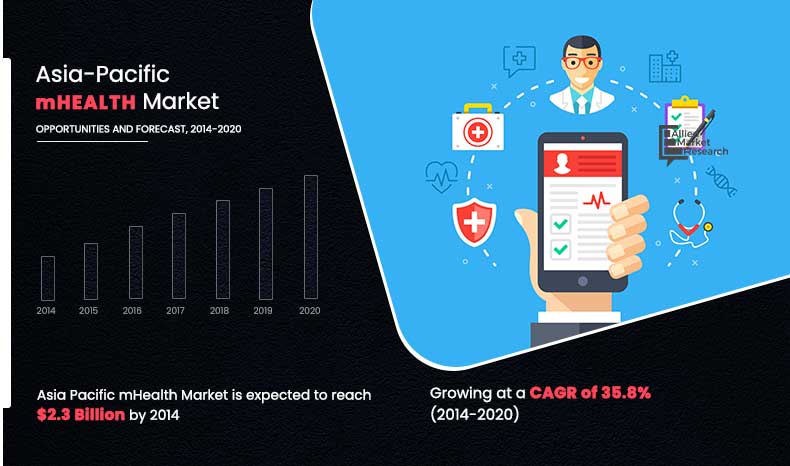APAC mHealth Market Overview:
Asia Pacific mHealth market was valued at $2.3 billion in 2014, supported by a CAGR of 35.8% during the forecast period 2015-2020. Asia Pacific mHealth market projects a remarkable growth rate, supplemented with the growing awareness of mHealth devices and services that aid in improve the quality of life for patients stricken with lifestyle diseases. The growing prevalence of lifestyle diseases such as diabetes, obesity, hypertension, chronic obstructive pulmonary disease (COPD) and obstructive sleep apnea (OSA), in Asia Pacific region, creates an impending need of technologically advanced platforms for the prevention and treatment of these diseases.
According to the National Institute of Health, China and India are the two highest populated nations, with an approximate diabetes count of 150 million patients. Thus, the need for regular health monitoring and treatment would be addressed by launch of smartphone-based medical devices. This growth is primarily driven by active government initiatives and the rising adoption of smartphones in Asia-pacific region. Presently, the market is witnessing a resurgence due to the increasing disposable incomes and the growing adoption of mobile phones. Moreover, a similar trend is observed in developing countries like India and Indonesia. However, factors such as consumers affordability, access to healthcare services and inaccuracy in results arising from discrepancies in devices would limit the growth of the market.
The market is segmented into devices, services, application, stakeholders and geography. Based on device type, the market is segmented into blood glucose meters, BP monitors, pulse oximetry, neurological monitoring devices, apnea and sleep monitors, wearable fitness sensor device & heart rate meters and others. The BP monitors segment holds a dominant share; however, the blood glucose meters segment is estimated to register the fastest growth in the Asia Pacific mHealth devices market. Factors such as incidences of hypertension, sedentary lifestyles, the increasing count of diabetics, supplement the adoption of mHealth devices. Based on services, the market is segmented into diagnosis services, monitoring services, prevention, treatment and wellness & healthcare system strengthening solutions. The monitoring services segment holds a dominant share in the Asia Pacific mHealth services market and would register the highest CAGR throughout the forecast period (2015-2020). Based on stake holders, the market is segmented into mobile operators, device vendors, healthcare providers and application players. Within the segment of stakeholders, mobile operators occupy a dominant share in the market. The segment of mobile application developers would register the highest CAGR during the forecast period (2015-2020). Based on applications, the industry is segmented into cardiovascular diseases, diabetes, respiratory diseases, neurological diseases and others. The cardiovascular diseases segment holds a dominant share in the Asia Pacific mHealth applications market; however, the diabetes application segment is expected to register the highest CAGR during the forecast period (2015-2020). Based on country, the market is segmented across Australia, China, Japan, India and Rest of Asia Pacific. China accounts for the largest market share, whilst India is the fastest growing region in this market.
The key players profiled in this report include - Philips Healthcare, Omron HealthCare, Inc., Bayer Healthcare, LifeWatch AG, Masimo Corporation, Sanofi S.A., Boston Scientific Corporation, AT&T Inc. and Johnson & Johnson.
ASIA PACIFIC mHEALTH MARKET KEY BENEFITS
- The report covers a detailed quantitative analysis of the current market and estimations through 2014-2020, which would enable the stakeholders to capitalize on prevailing market opportunities
- The market scenario is comprehensively analyzed based on key countries
- Key market players are profiled in the report and their strategies are analyzed thoroughly, which helps in understanding the competitive outlook of the market
- Extensive analysis of the market is conducted by closely following key product positioning and monitoring the top contenders within the market framework
- Comprehensive analysis of factors that drive and restrict the growth of the market, is provided in the report
- Exhaustive analysis of the market, by device type, helps in understanding the types of devices that are currently being used along with the variants that would gain prominence in future
ASIA PACIFIC mHEALTH MARKET KEY SEGMENTS:
By Devices
- Blood glucose meters
- BP monitors
- Pulse oximetry
- Neurological monitoring devices
- Apnea and sleep monitors
- Wearable fitness sensor device & heart rate meters
- Others
By Services
- Diagnosis services
- Monitoring services
- Prevention
- Treatment
- Wellness and healthcare system strengthening solutions
By Stakeholders
- Mobile operators
- Device vendors
- Healthcare providers
- Application players
By Application
- Cardiovascular diseases
- Diabetes
- Respiratory diseases
- Neurological diseases
- Others
By Country
- Australia
- China
- Japan
- India
- Rest of Asia-Pacific
Asia-Pacific mHealth Market Report Highlights
| Aspects | Details |
| By DEVICES |
|
| By SERVICES |
|
| By STAKEHOLDERS |
|
| By APPLICATION |
|
| By COUNTRY |
|
| Key Market Players | Bayer Healthcare (a division of Bayer), Philips healthcare (a division of Royal Philips company), Boston Scientific Corporation, AT&T Inc., Johnson & Johnson, LifeWatch AG, Masimo Corporation, Sanofi, Omron healthcare Inc. |
Loading Table Of Content...



